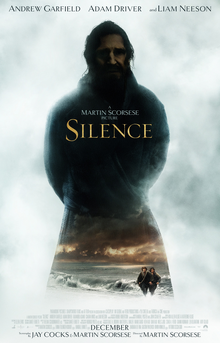
Any film made by Martin Scorsese is guaranteed to be among the year’s most notable works due to the director’s reputation alone. It duly went straight to the top of many critics’ lists though it met only middling success on the awards circuit. I thought it was intriguing, about the travails of Christians in 17th century Japan and so put it onto my own list.
Following news of mass torture and killings of Christians in Japan, two young Portuguese Jesuit priests, Rodrigues and Garupe, insist on travelling in search of their mentor Ferreira who they hear has renounced his faith. Their guide is Kichijiro, a broken shell of a man whose whole family of Christians were killed, but who himself survived by repeatedly denouncing Christianity. When they arrive they discover that an underground Christian community still exists and they are desperate to have the services of ordained priests though extreme secrecy is required. Inevitably they are eventually discovered and captured by the local governor Inoue who is also known as the inquisitor who hunts down Christians. Rodrigues is separated from Garupe and instead of torturing him directly, the Japanese authorities torture the Japanese Christians in order to force him to apostatize. He reaches his breaking point however when he learns that the rumors are true and Ferreira really has publicly renounced Christianity and has taken a Japanese name together with a Japanese family.
Awkward as it sounds, for the longest time while watching Silence, my wife and I couldn’t make up our minds whether this film was supposed to pro or anti-Christianity. The final scenes remove all ambiguity and I don’t think it’s much of a spoiler to say that it really is meant to be viewed as a testament to the tenacity of Christians in the face of implacable hostility. Before that however there is some room for doubt. As my wife notes the title itself appears to refer to God’s complete silence even as his flock prays for relief as they face torture and massacre. Inoue advances a reasonably intelligent argument that Christianity isn’t suited for Japan as the Japanese merely apply the Christian terms to Japanese concepts that are more familiar to them. In some films some ambiguity may add depth but here it feels more like mixed messaging that detracts from the director’s intended effect.
For me, this is a problem that afflicts the film as a whole. It’s obvious that Scorsese wants the audience to be moved by the Christians’ suffering and how desperately Rodrigues prays to no avail. Yet I feel nothing. Partly this is because Andrew Garfield is just not a good enough actor to pull of such a weighty role. Partly because instead of emoting through visuals, the film wants to convey Rodrigues’ anguish through his internal narration. Telling the audience the mental state of a character rather than showing it almost never works, and it’s made worse here by how pedestrian the writing is. The film never presents a positive case for having faith in God, treating it more like an obligation. There’s no sense of wonder or awe, and as previously noted, little succor to be found. It’s so bad at communicating the love of God that I wondered if Scorsese is a devout believer himself. He must be, I later realized, because this seems to be a vanity project and the last of a trilogy of three films about religion, but it sure doesn’t feel like it. Even the scenes in which we are meant to shudder at the suffering of the Christians seem weak. Scorsese seems reluctant to confront the horror head on so it feels like we’re watching it at a remove, detached from the visceral rawness of the experience.
The only bits I liked were the landscape shots of 17th century Macau and Japan. We’ve seen such scenes in Asian cinema of course but it’s good to see how a Western director interprets the era. As usual, Scorcese technical skills are beyond criticism and the landscape shots look perfect. Yet at the same time, I feel that this precision is at odds with the personal nature of Rodrigues’ ordeal and detracts from its sense of authenticity. I dislike pretty much everything else. Neither Garfield nor Adam Driver seem convincingly Portuguese. I hate how the film dances awkwardly around language issues. I hate how Inoue speaks in an intelligent manner, yet the actor plays him with a somewhat weaselly body language. Perhaps the character with the most potential here is Kichijiro, with how his pattern of repeatedly sinning and asking for absolution strains the limits of the Christian concept of forgiveness but he remains something of a cipher until the end of the film.
Scorcese may be a legendary director but I found this to be a horrible misstep that fails on all counts. I suppose it may be the first film to cover the persecution of Christians in Japan but its poor execution is unworthy of the subject matter. For a film that truly conveys a powerful love for God, try The Tree of Life. For a great depiction of religious persecution in a society, try Agora. And of course for the purest expression of physical pain endured in the name of religion, I don’t think any film can ever match The Passion of the Christ.